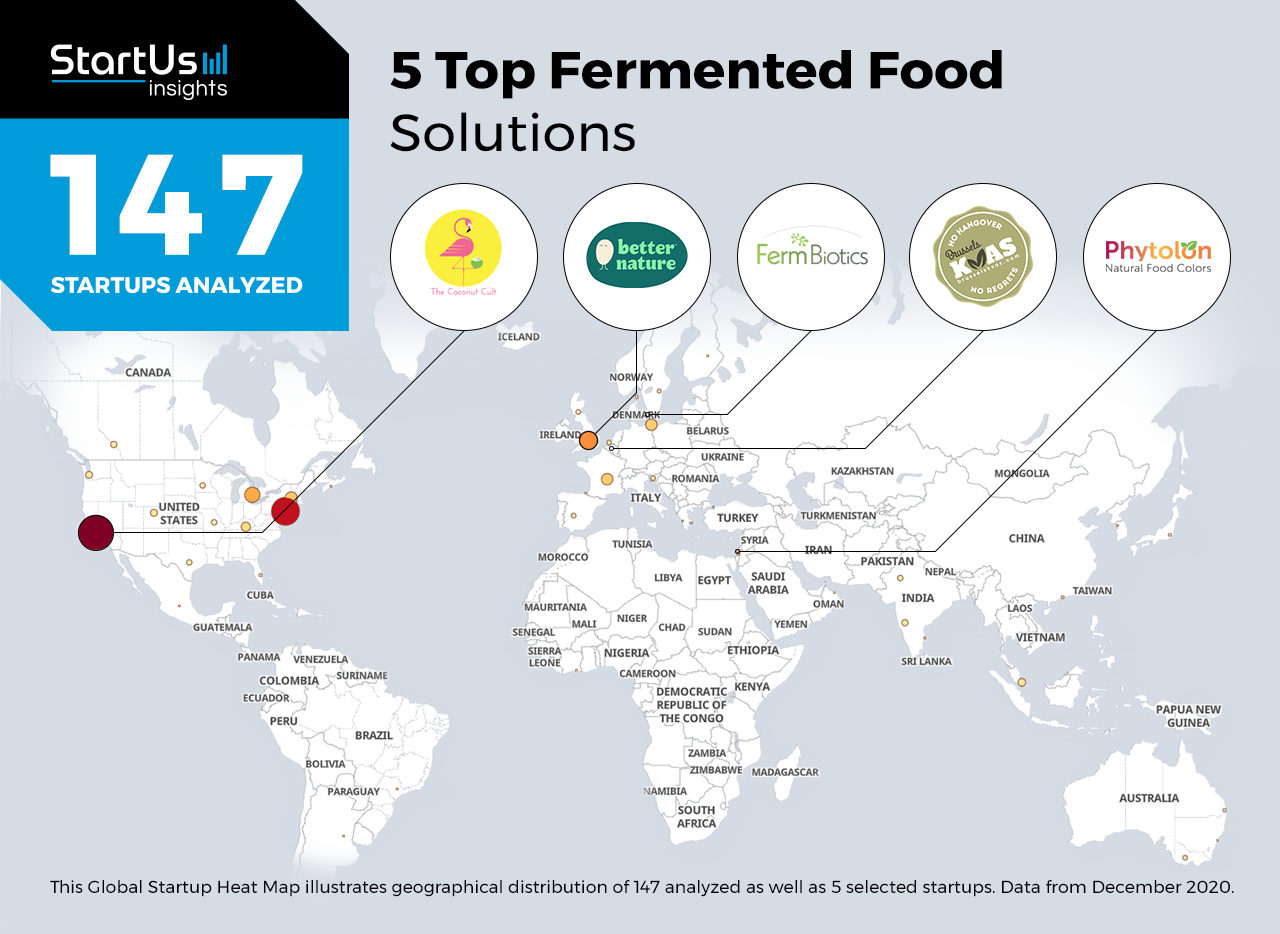Staying ahead of the technology curve means strengthening your competitive advantage. That is why we give you data-driven innovation insights into the food industry. This time, you get to discover 5 hand-picked startups developing fermented food solutions.
Global Startup Heat Map: 5 Top Fermented Food Solutions
The 5 FoodTech startups you will explore below are chosen based on our data-driven startup scouting approach, taking into account factors such as location, founding year, and relevance of technology, among others. This analysis is based on the Big Data & Artificial Intelligence (AI)-powered StartUs Insights Discovery Platform, covering over 1.3 million startups & scaleups globally.
The Global Startup Heat Map below highlights the 5 fermented food solutions our Innovation Researchers curated for this report. Moreover, you get insights into regions that observe a high startup activity and the global geographic distribution of the 147 companies we analyzed for this specific topic.
The Coconut Cult – Non-Dairy Yogurt
Fermented dairy products are a rich source of probiotic bacteria. However, vegans and lactose-intolerant people need alternatives. FoodTech startups combine microbial fermentation with plant-based foods to provide just that. Startups ferment soy, almonds, or coconuts, to name a few plant-based alternatives, with live bacteria to produce non-dairy yogurt. Since probiotics stem from the fermentation process, non-dairy yogurts have a similar probiotic profile compared to dairy yogurt.
US-based startup The Coconut Cult produces non-dairy probiotic foods. The startup uses organic ingredients, including coconut cream, coconut meat, and cacao, as well as a custom probiotic blend to create their yogurt. The small-batch fermentation process results in 800 billion active probiotics in every quart, comprising different strains of Lactobacilli and Bifidobacteria.
Better Nature – Plant-Based Protein
Cultures across the world eat fermented food, such as sauerkraut and miso to name a few. FoodTech startups are tapping into this diversity of cuisines and creating innovative fermented foods. Fermentation makes these foods more easily digestible while they also contain more proteins and amino acids, making them rich sources of plant-based protein.
British startup Better Nature offers tempeh-based food products. Tempeh, a fermented soybean product originating from Indonesia, is naturally rich in protein and fiber. The startup’s fermentation process uses a custom fungal culture, producing tempeh with more vitamin B12 than the conventional version. Additionally, Better Nature creates fermented foods based on lupin beans.
Phytolon – Natural Food Colors
Consumers’ demand to replace synthetic pigments with natural food colors is growing. However, extracting natural colors from plants or insects is cumbersome and introduces batch-to-batch variation. Growing food colors with microbial fermentation is a scalable and easily manipulable alternative. That is why FoodTech startups are engineering microbes to make the cost of natural food color production comparable to synthetic colors.
Phytolon from Israel replaces farming with fermentation to produce betalain pigments, naturally found in beetroot and cactus fruit. The switch from farming to yeast fermentation enables significant savings in raw material and processing costs. The startup’s betalain-based pigments cover the full spectrum of colors from purple to red.
Brussels Kvas – Low-Alcoholic Beverage
The popularity of low-sugar, low-alcoholic beverages is on the rise. These drinks reduce anxiety and stress, promote better sleep, and improve cardiovascular health. FoodTech startups are working on fermentation methods that minimize the amount of sugar and alcohol in the final product so that it meets consumer demands. Just like in alcoholic drinks, the fermentation process contributes to the taste, providing consumers with a similar-tasting, but healthier alternative.
Belgian startup Brussels Kvas produces natural fermented low-alcoholic beverages. The base ingredients of Brussels Kvas’ low-sugar beverages are rye and barley. Unlike beer production that uses alcoholic fermentation, the startup’s process uses lactic acid fermentation. The process results in a beverage with less than 1.5% of alcohol, largely coming from wild yeasts. The unfiltered and unpasteurized drink is rich in probiotics and continues to ferment in the bottle.
FermBiotics – Dietary Supplements
Fermented foods offer two major benefits – they provide beneficial probiotic bacteria and make nutrients in the food easily digestible. These benefits also apply to fermented dietary supplements. Food startups now offer products that include fermented versions of different supplement ingredients. In addition to increasing the bioavailability of nutrients, the process also introduces potentially antioxidant and anti-inflammatory bioactive compounds.
FermBiotics is a Danish startup developing natural fermented seaweed and plant products. The startup’s dietary supplements pack fermented canola and seaweed, as well as live beneficial bacteria in a superfood mix. FermBiotics’ supplements improve gut health, provide a natural anti-inflammatory effect, and maintain muscle function, supporting athletes to recover faster, for example. Besides, the startup also offers pet food supplements.
Discover more FoodTech startups
To keep you up-to-date on the latest technology and emerging solutions, we provide you with actionable innovation intelligence – quickly and exhaustively. You can download our free FoodTech Innovation Report and discover new business opportunities or save your time & let us look into your areas of interest. We provide you with an exhaustive overview of new startups, scaleups & emerging technologies that matter to you.



![Food and Beverage Industry: Top 10 Technology Trends [2025 & Beyond]](https://www.startus-insights.com/wp-content/uploads/2024/11/Food-and-Beverage-Industry-Trends-SharedImg-StartUs-Insights-noresize-420x236.webp)






